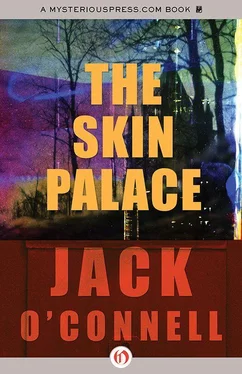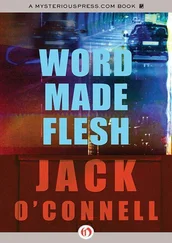Sylvia debates taking the photos with her as she dresses. She thinks about printing up a second set for safekeeping, but she knows if she goes down in the cellar it’ll be afternoon before she gets down to the Canal Zone. She leaves the shots in the darkroom. She takes her Canon and on the bus down to the Zone she loads a fresh roll of film and day-dreams titles for the Aquinas series.
Skin & Stone, #s 1–7.
Last Inhabitants of the Cathedral.
Madonna and Child, Forgotten, Post-Apocalypse.
Everything sounds too gallery-hip to her. It’s more likely the series has no name, that if the artist couldn’t bring himself to finish the work, he probably didn’t even consider titling it. She keeps coming back to the question of what was going through the photographer’s mind each time he pressed the shutter button. She’s not sure why this is so important to her. It’s probably another conceit, another hope for a dream methodology, a system for turning yourself into a real artist, injecting yourself with instinct and vision. What if the photographer could, in fact, tell her exactly what he was thinking when he captured those seven pictures? What if he could convey the exact experience, nail down for her the feel of the moment, the aura that came from his subjects, the surety of his focus and timing and overall judgment? What would it get her? Would she walk away from this stranger any closer to finding and nailing her own moment, to freezing her own seven pieces of vision?
She gets off the bus on West Street, walks around the corner onto Waldstein and down a block to Jack Derry’s. She pulls open the door and steps into the shop and stares at a completely empty shell. She moves inside, stands in the center of the room and turns full around. The entire store has been stripped. The piles upon piles of unsorted equipment have vanished. The plywood counter is completely cleared. The antique cash register is missing. Even the curtain that hid the back storeroom is gone.
This is impossible. She was here twenty hours ago. The more she looks around, the more she starts to notice small things. Weird, quirky, little things. The store has been more than stripped. It’s been gutted. The face plates are missing from the electrical outlets. A full section of paneling has been torn off a side wall exposing the gouged plaster underneath. And behind the counter what might have been a phone jack has been ripped out, leaving a half-inch of multicolored wires hanging in the air. There isn’t a single camera or lens or flash to be found. Not a filter or canister of film. If you didn’t look at the sign outside, you’d never know what had once been sold in here.
She walks into the storeroom and it’s the same story. There’s a wall of metal cabinets, the doors wide open and not a thing inside. The walls of shelving are all completely bare. There isn’t a bag of rubbish nor a basket of trash. Not a carton of useless junk left behind for the next tenant to deal with. There’s not a scrap of physical evidence that yesterday at this time, this store housed a used-camera business that had been in operation, according to the sign out front, since 1965.
She’s still standing in the storeroom in shock, staring at the empty storage shelves, when she hears the voice.
“You’re looking for Derry?”
Her heart punches in her chest and she spins around, off-balance, to see a tall, elderly man standing in the front entrance. She takes a breath and a swallow and says,” Excuse me?” even though she heard his question.
He steps into the store and says, “Forgive me. I didn’t mean to startle you.”
He’s got some sort of accent that Sylvia can’t place and as he steps closer she sees he’s carrying one of those retractable white canes and she looks up to his face and sees that his eyes are completely whited out, glazed over with such severe cataracts that the pupils are no longer even visible. The glazing of the eyes gives him the look of a malignant librarian. He’s got huge ears. His hair is thin and wispy and white and combed back over the crown of his head, but his eyebrows are as thick as caterpillars. The top half of his face is gaunt, the bottom almost jowly. His skin is the color of faded newspaper.
She comes out of the storeroom as far as the front counter.
“No, that’s all right. No problem. I just … I was in here yesterday. What happened? Where’d he go?”
The old man sighs and shuffles forward until his right hand touches the countertop. He’s dressed in a kind of old-fashioned three-piece suit that’s gone seedy and permanently rumpled. But there’s something about the way he carries himself. Kind of formal and dignified. Really sort of archaic. Like Sylvia’s idea of old-time European. Like the way she’d expect some early-century count or duke to hold himself.
“I was hoping,” he says, “you might tell me.”
She shrugs and then realizes he probably can’t see her and says, “I’m just a customer. Was a customer. I picked up a camera here yesterday. I haven’t even paid for it yet. I needed to talk to—”
“Derry,” he interrupts.
“Yeah,” she says, “Mr. Derry. About the camera. I need to pay him.”
“I’m afraid,” he says, “I have just the opposite problem. Derry owes me a good deal of money. I was worried something like this might happen.”
He tilts his head back until his face is aimed at the ceiling. It makes her uncomfortable and she says, “This is crazy. He can’t just pack up and disappear overnight. That doesn’t happen.”
He brings his head back down. “It appears that is exactly what has happened.”
“I can’t believe this.”
The man folds his hands together and rests them on the counter. “You are not one of Derry’s regular customers?” he says.
She looks at his face, then looks past him to the front door and it suddenly strikes her how out of place he appears. The old suit and the formal manner. They’re in the Canal Zone, for God’s sake.
“Do you work here?” she asks.
He gives a brief smile and shakes his head. “Forgive me, again. Derry’s departure is no excuse for my rudeness.” He actually bows slightly and says, “I am Luis Quevedo. I am the manager next door. Derry was my neighbor, you see.”
“Sylvia Krafft,” she says and puts out her hand to shake, but he takes it and brings it up to his lips and kisses it.
She gets a little flustered and amused and blurts out, “Next door?” then immediately regrets it. But Mr. Quevedo just smiles and nods, takes a business card from his pocket and extends it toward her. She looks at it and reads
Brody’s Adult Books
purveyors of fine erotica
custom tailored to your individual needs
L. Quevedo, manager
“You manage the place next door?” she says.
“For over twenty years now,” he says. “It was the first job I found after I emigrated. It has supported me well all these years.”
“I’m sorry,” she says. “I didn’t mean to sound so surprised. You just don’t look … I mean, you just didn’t seem—”
“Have you ever visited my store?” he asks.
“No,” she says, biting off a laugh. “No, I don’t believe I’ve ever visited.”
His shoulders sag a bit and he nods and says, “Would you like to visit now?”
“Oh,” she says, caught off guard. “Well, I don’t think so. Thank you for the offer and all. But I should really get going. I should really—”
“It’s very slow in the morning,” he says. “I could make us some tea. We could discuss our mutual problem.”
“Problem?”
“How to find Derry? You still wish to find Derry, don’t you?”
“Yeah,” she says. “Yes, but—”
“Please, Sylvia, you have nothing to fear from an old man. You can see that, can’t you?”
Читать дальше











